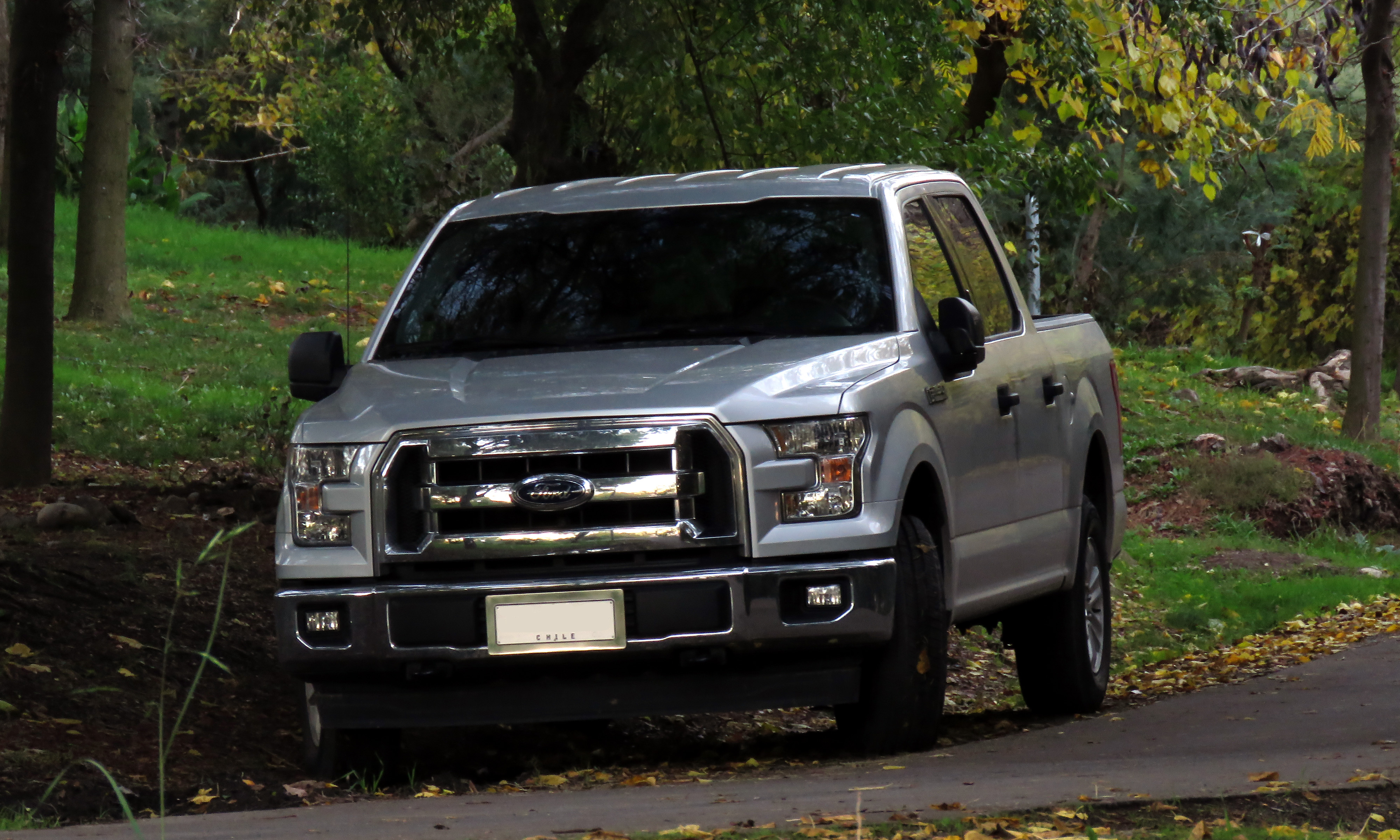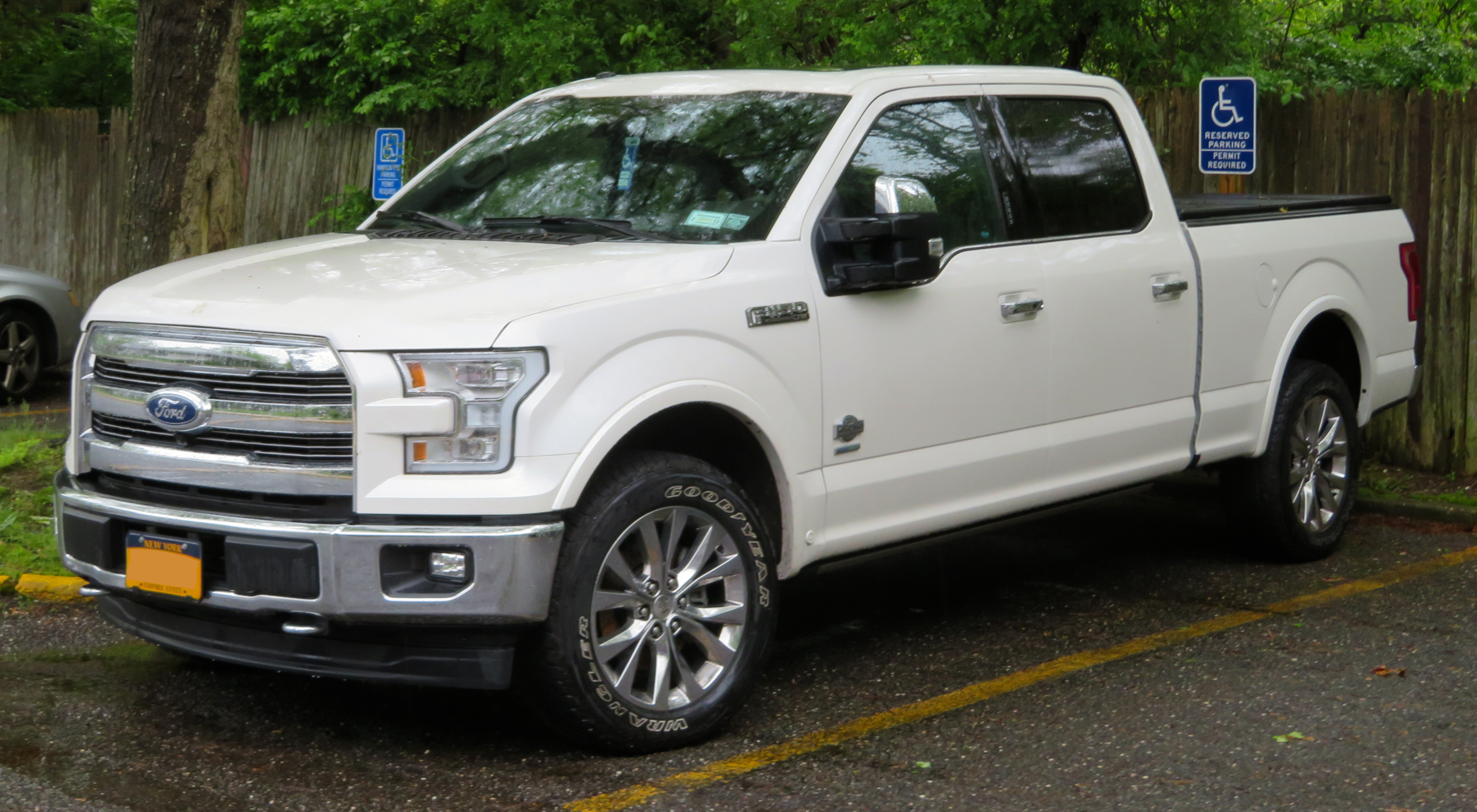2017 Ford F150 Specifications, Pricing, Pictures and Videos

About this model:
Eleven major redesigns mark the history of the F-Series pickup trucks produced by Ford Motor Company starting in 1948 and continuing through to the present day. The first F-Series were introduced in 1948 to replace their car-based pickup truck line.Models were numbered F1-F8 corresponding to increasing size and load capacity. The F1 was the most popular, a ½-ton truck with a 6.
5 foot bed, followed by the F2 (3/4-ton) and F3 (3/4-ton Heavy Duty). The design marked a departure from earlier trucks by having a one-piece windshield, integrated headlights, and smoother body panels.
Several engines were available with a 226-cubic-inch inline flathead 6 producing 95 horsepower at the bottom and a 317-cubic-inch Y-block producing 155 horsepower at the top for use in the F8. A "Marmon-Herrington All Wheel Drive" was available for this generation and continued to be so through 1959.
The line was redesigned for 1953 and the now-familiar numbering scheme was introduced with the F-100 ½-ton as the base model, and the F-250 (3/4-ton) and F-350 (1-ton) making up the higher end. Low gross vehicle weight rating (GVWR) versions of all three models were offered for this generation.
The overall look was more integrated and the hood flowed into the front grill rather than just sitting on top of it. Several amenities were introduced including a lighter, interior dome light, sun visors, and arm rests.
Power steering was also introduced as an option. 1957 saw the introduction of a lower hood that was flush with the front fenders and a new body style called the "Styleside" that had smooth sides where the separate rear fenders used to be (called "flareside").
A unibody design with an integrated box and cab were available from 1961 to 1963 but discontinued for 1964. Both flareside and Styleside body styles were still available and the Ranger nameplate was introduced as a styling package.
More styling changes and engine options came with the 1967 models. The low-GVWR models were dropped after 1968 but several other functional option packages were introduced such as the Explorer Special, which was only a trim package, and Contractor, Farm and Ranch, and Heavy-Duty Specials which included special engine and suspension packages and other functional options.
In 1975 the popular F-150 was introduced, basically an F-100 with a heavier GVWR (6,200 pound maximum compared to the F-100's 5,700 pound maximum). By 1976 the F-Series became the best selling vehicle – not truck, vehicle -- in the United States which it has held ever since.
A number of design elements were changed in 1980. Overall, the truck had sharper, squarer lines.
The "Ranger" trim package was dropped in 1982 since that name was to be used on the upcoming smaller pickup, and in 1982 letter-based trim levels were being used: XL, XLS, and XLT Lariat. This was also the first year that the blue oval Ford logo replaced the "FORD" letters on the hood.
The biggest change was dropping the venerable F-100 in favor of the F-150 as the base model. The 302 V8, originally introduced in 1969, was upgraded to fuel injection in 1985 adding an additional 60 horsepower for 190 total and foreshadowing later fuel-injected engines.
These were also the last American vehicles to have a column-mounted shifter. In 1987 the overall design was made more streamlined and a number of options were introduced.
It became the first truck to have rear anti-lock brakes as an option, and automatic locking hubs in the four-wheel drive system were introduced. Engines were now sized in metric-only units and all became fuel-injected after 1988.
The 6. 9 liter diesel was discontinued in 1988 and was replaced by a 7.
3 liter International Harvester IDI diesel V8. The "Super Duty" model was also introduced, basically a cab with no bed, which would be installed after the build date depending on its future use.
The Flareside option was also dropped in 1988. Between 1992 and 1996 outward appearances continued to become more streamlined.
The Lightning Performance Truck was introduced in 1999 and contained a number of forward-looking features: 17-inch aluminum wheels, special handling features, and gas-charged shocks, and a 240-horsepower version of the 5. 8 liter V8.
The Lightning was only offered in 2-wheel drive standard-cab versions. Several safety features were also added in 1994: passenger-side airbags, side door beams, and a center-mounted brake light.
An Eddie Bauer edition was added as a trim line, and the Custom base trim level was dropped after 1992, with the XL becoming he base trim line. A new 7.
3 liter "Power Stroke" diesel was introduced that churned out a massive 425 pound-feet of torque; this was only available on the F-250 Heavy Duty line. Both the Flareside and Lightning were dropped from the lineup in 1996.
Aerodynamic styling continued with the 1997 redesign and the engine lineup was also completely revamped. Both the 1997 and 2004 F-150 was Motor Trend's "Truck of the Year" and sales reached 900,000 in 2001 and 939,000 in 2005.
A new Lightning was introduced in 1999 and continued until 2004. Numerous body styles were available including regular and SuperCab, standard or flareside, and long and short beds.
The F-150 was further redesigned in 2004 using the P2 platformAn offshoot of the F-Series was the Bronco. The original (1966-1977) had not been directly based on an existing truck platform although it did share a number of parts notably the axles and brakes) from the F-100.
In 1978, the Bronco was redesigned and based on the F-series trucks, and was redesigned again in 1980 along with the other F-Series trucks. The Bronco largely followed the various redesigns of the F-Series until it was discontinued in 1997 in favor of the Expedition.
Model strengths:
Towing capacity; efficient turbocharged engines; available in a huge variety of trims; improved gas mileage; rugged durabilityModel Changes:
The biggest changes to the F-150 for 2017 come from an improved drivetrain. The 3.5L 'EcoBoost' engine gets a small bump in power for this year as well as a big jump in torque. Meanwhile both rear wheel drive and 4x4 versions of the F-150 get an optional 10-speed automatic transmission, aiding in both available power and fuel economy.
Additionally, a new STX appearance package is available. .
. Read moreThe biggest changes to the F-150 for 2017 come from an improved drivetrain.
The 3. 5L 'EcoBoost' engine gets a small bump in power for this year as well as a big jump in torque.
Meanwhile both rear wheel drive and 4x4 versions of the F-150 get an optional 10-speed automatic transmission, aiding in both available power and fuel economy. Additionally, a new STX appearance package is available this year along with a few new exterior colors.
Model Value:
The F-150 might be the most important vehicle made by Ford. It continues to be one of their top-selling vehicles, encouraging Ford to put their best foot forward with the 2017 model.The F-150 competes with the Ram, the Chevrolet Silverado and the GMC Sierra 1500, among others, in the full-sized truck category. Ford is clearly pushing its new technology and new ideas with the F-150, offering plenty of options not available anywhere else in this class, such as a 360-degree camera and integrated loading ramps stowed in the pickup bed.
A smaller, more fuel efficient EcoBoost engine is also available, which should further improve fuel economy while providing the same kind of horsepower that would normally be delivered by mid-grade V8 engines. At the same time, the F-150 continues to excel at traditional truck tasks, with a best in class towing capacity of 12,200 pounds when properly equipped.
Model Overview:
The 2017 F-150 has to be many things to many people. From work truck to cruiser, off-road vehicle to boat hauler, there is an F-150 for virtually every task.As a result, the lineup is diverse. There are four engines available on the F-150, six trims, and several body options.
The most basic engine is a 3. 5L V6, which produces 283 horsepower and 255 pound-feet of torque, allowing for a tow rating of 7,600 pounds, which bests other competitors when equipped with their basic V6 engines.
The next step up is a 2. 7L turbocharged V6 that makes 325 horsepower and 355 pound-feet of torque.
A bigger 3. 5L turbocharged V6 makes 375 horsepower and 470 pound-feet of torque, helping the F-150 rate a class-leading towing spec of 12,200 pounds.
The top-of-the-line 5. 0L V8 makes 385 horsepower.
Trims include XL, XLT, Lariat, King Ranch, Platinum and Limited. The basic XL trim is available with three different cab sizes and three different bed lengths in either 2WD or 4WD configurations.
Owing to its work-truck pretensions, the XL is relatively light on bells and whistles, with just basic utilities like an AM/FM radio and a 4. 2-inch screen in the center stack.
The XLT, while still relatively basic, adds chrome bumpers, Ford's SYNC 3 system, fog lamps, an alarm, air conditioning, automatic headlamps, cruise control, keyless entry, power windows, a powered tailgate and power door locks. Lariat-trimmed F-150s start to venture into more luxurious territory and are only available with extended or crew cab cabins.
Standard equipment on the Lariat includes power folding door mirrors, a rearview camera, 18-inch wheels, ambient interior lighting, steering wheel-mounted audio and cruise controls, a power sliding rear window, an auto-dimming rearview mirror, leather-trimmed seats, a 10-way power adjustable driver's seat, SiriusXM satellite radio and an 8-inch touchscreen. King Ranch versions come standard with the 5.
0L V8 engine, a crew cab cabin and 2-tone exterior paint. Other features on the King Ranch include LED box lighting, LED headlamps, lots of exterior chrome, heated side mirrors with integrated turn signals and an auto-dimming feature on the driver's side, a remote starter, heated front and rear seats, wood interior trim and dual zone climate control.
The Platinum version is the urban cousin to the King Ranch trim. Like the King Ranch, it's only available with a crew cab and the 5.
0L V8. It also features a voice-activated navigation system, unique 20-inch polished aluminum wheels, LED side mirror spotlights, power deployable running boards, aluminum interior trim and a leather wrapped and heated steering wheel.
Finally, the Limited trim rides on 22-inch wheels and makes standard a whole range of convenience items that are optional on lesser trims. These include a 360-degree camera with split-view display, remote tailgate release, a twin-panel moonroof, and more.
Special Edition packages available on XLT and Lariat trims add appearance items such as unique 20-inch wheels with red sport lettering, black running boards, smoked headlamps, and exterior graphics, while the interiors benefit from special seats with Alcantara inserts and red contrast stitching throughout.
.
Pictures of 2017 Ford F-150













